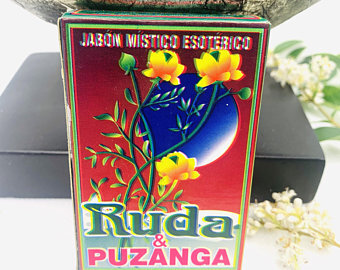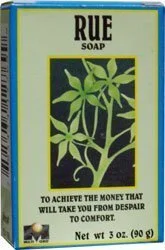Esoteric Soap and the Commodification of Dreams
How marketing imbues cleanliness with magic powers
By Jo Austen.
Purification has long been culturally represented as a deified, or supernatural act. From John Wesley’s declaration that ‘cleanliness is next to godliness’, to adverts promising ‘magic’ stain removal, cleaning and cleansing have long been intimate with the vocabulary of the miraculous. In the language of advertising, this magic tends to be limited to the transformative act of cleaning itself – the product framed as some conduit of divine intervention destined to redeem one’s carpet. But there is another kind of cleaning ‘magic’ available in parts of Mexico, Central and South America, where Jabones Esotéricos (esoteric soaps) proffer to enact a change that extends far beyond the physical cleansing process.
Jabones esótericos are sold in small, opaque boxes loaded with illustrations signifying the outcomes they provide. There are jabones esotéricos for all manner of human conditions and desires: from finding true love, to business success, to taming a wayward husband. Especially popular is Ruda soap, made with rue and used by healers and shamans to rid the body of envy and negativity.
Though the core ingredients do not differ from a non-magic bar of soap, the magical components in magic soap are manifold. Firstly, the soap is manufactured using ‘guaranteed’ esoteric, rarefied practises – look for the embossing on the soap bar as a seal of authenticity. The buyer must then select their soap and its intention from a colourful array of packaging. Inside, they’ll find a prayer to recite or chant while using the soap. Despite this being a type of non-Christian sympathetic magic*, the prayer is likely to include references to Jesus or the Virgin Mary. Such references can make the esoteric soap more amenable to (primarily) Catholic consumers.
The user’s faith in the soap’s powers rests on a twofold premise: that luck dictates success, and that luck can be changed and manoeuvred with a little (paid for) help. Luck was originally linked to fortune and destiny, seen as something apportioned by a divinity. In this respect, magic soap takes divinity as a given, and encourages appealing to a particular deity to alter an otherwise pre-destined fate. Magic soap relies on faith, and belief that luck is not a random occurrence, but controllable.
Whereas such superstitious phenomena as rabbit’s feet and horseshoes do not serve a functional purpose (beyond optimistic ornamentation), the act of regular washing does, at least, have observable physical benefits. In addition, ritualistic washing with a bar of soap to attract a partner may encourage more flirtatious behaviour (plus, you might smell better!); or, when looking to succeed in the workplace, the belief that you cannot fail may lead to increased risk-taking.
The business model of esoteric soap can be found across the globe. The magical connotations may not always be as explicit, but they remain the same. For a sum substantially higher than a bar of magic soap, you can purchase a variety of Moon Juice Moon Dust from Gwyneth Paltrow’s Goop. There’s a range of dusts to meet one’s ‘needs’ – sex dust, power dust, brain dust, and so on. As with the name jabon esotérico, the branding of Moon Dust marries the cosmic & otherworldly with the mundane.
Moon Dust, we’re told on the website, is prepared by ‘highly trained alchemists’. Alchemy was a medieval practise whereby different substances were heated and combined in an attempt to find the elixir of life, or to turn lead into gold. As though in a Midas-inspired parallel to turning lead into gold, Moon Dust sells a range of products marketed to suggest there is an alternative to mainstream approaches to health, beauty and success - products that transform ‘dust‘ into golden achievements, while also accruing plenty of gold for the highly profitable company that sells them.
“I’ve seen women insist on cleaning everything in the house before they could sit down to write... and you know it’s a funny thing about housecleaning... it never comes to an end.”
- Clarissa Pinkola Estés, Women Who Run With the Wolves: Myths and Stories of the Wild Woman Archetype
Under this new maxim, cleanliness is next to costliness, more than godliness. Magic soap - and Moon Dust - both serve to appease the desire to exert control over those aspects of life that are unfavourable. Both appeal to the desire for results with relatively little effort. However, as readers of fairy tales will know, hard work and due diligence leads to reward, whilst taking (magical) shortcuts inevitably leads to trouble. What is it that makes beauty and cleansing so ripe for discourses of myth, magic and enchantment? A bar of magic soap has a ritualised discretion, but the link that underlies consumerist beauty, cleansing, and the Moon Dust brand of wellbeing all rely on the same (capitalist and secular) premise: that you need something external, ever-beyond your reach, to become a better version of yourself.
By Jo Austen. Read Jo’s piece on female initiation rites in fairytales in issue 4: capri.
return to HOTEL >
* whereby an object or action involved in magic practice has qualities similar to that which the magic attempts to influence - a voodoo doll, for example.





